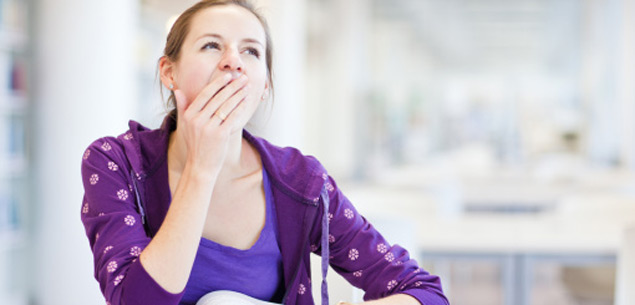Most of us realise when we’re sleep deprived – being really tired is a dead giveaway.
But sometimes, getting inadequate sleep becomes such a normal part of life that we get used to being worn out and we’re not aware of how a lack of shut-eye affects us. If you suffer from any of the following, there’s a chance you need more sleep.
• You’re more prone to catching colds and viruses.
People who get fewer than six hours sleep a night are four times more likely to get a cold than those who sleep for seven hours or more. That’s because sleep deprivation affects the immune system – the white blood cells that attack viruses don’t reproduce effectively when we haven’t had enough sleep.
• You speak funny.
When you’re tired, your voice may sound flat and monotone. Tiredness means you don’t have the same control over the muscles in the throat that are responsible for the sound of your voice that you do when you’ve had enough sleep. You may also find yourself pronouncing words differently and stumbling over sentences.
• You notice more aches and pains.
People who are tired have less pain tolerance, possibly because the inflammatory chemicals that play a part in the pain process are raised after a poor night’s sleep.
• You lose your sense of humour.
US researchers have found that we lose the ability to find things funny when we’re tired. This is because being amused is a complex process that requires several parts of the brain to work together. These parts are controlled by another area called the prefrontal cortex, and this is most affected by a lack of sleep.
• You eat more than usual.
The prefrontal cortex also controls willpower, and when it is weakened by a shortage of sleep, levels of the hormone ghrelin, which stimulates appetite, increase by 20%. At the same time, levels of another hormone called leptin, which tells us when to stop eating, fall by 18%, so we end up eating more. This, of course, can lead to weight gain. Other research shows that sleep deprivation affects the way the body responds to insulin, which can also result in us piling on the kilograms. And when you’re tired, you are much less inclined to exercise.
• You forget stuff.
Being tired means your brain doesn’t work as efficiently as it should, and one of the things it falls down on is memory. It appears to affect your ability to store and retrieve information.
Here’s what else a lack of sleep does to your health:
• Leads to serious problems such as heart disease and heart failure, high blood pressure, strokes and diabetes
• Kills your sex drive
• Can worsen depression
• Makes it harder to concentrate and make informed decisions
• Ages your skin
• Increases your risk of an early death.
If you notice you have any of the above signs, then it’s important that you make the effort to try to get more sleep.
One person who realises the importance of a good night’s sleep is wellness blogger Libby Matthews. She also knows that it can be harder to get a decent night’s sleep in summer, thanks to warmer temperatures at night, and extra social activity, which can play havoc with people’s sleep patterns.
Libby had a consultation with sleep specialist Dr Karyn O’Keeffe, from Massey University, and after keeping a sleep diary for a week realised that her bedtime was getting later and later. She also became aware that she was spending too much time in the evening using electronic devices, which can also have negative consequences on sleep.
Libby shares with us the advice she got from Karyn on how to improve her sleep.
How to improve your sleep by Libby Matthews
• Practise deep breathing before bedtime.
A stressful day can lead to us taking short, shallow breaths. Spend 10-20 minutes before going to bed, focusing on your breathing, deep in your belly.
• Turn off electronics an hour before going to bed.
I use time before bed to answer emails, catch up on social media or watch TV. Some of these tasks might feel relaxing, but the light emitted from the screens interferes with the production of melatonin, the sleep-producing hormone. Try reading instead – it helps the body to relax, making it easier to fall asleep.
• Get out in the sunlight each morning.
This tells your body it is daytime and not night, which helps reset your body clock. Try setting your alarm for 20 minutes earlier and going for a walk in the sunshine.
• Don’t exercise late.
Exercising too late in the evening can have an impact on the quality of our sleep. It raises the core temperature of the body, making it difficult to fall asleep, so it’s best to avoid it.
• Set a regular bedtime and wake-up time.
This helps you to get into a regular sleep routine so your body clock can adjust. After a while, you will find yourself waking up at the same time without using an alarm.
• Try to sleep for around eight hours.
We should be trying to get eight to nine hours sleep a night, and should be asleep by 11pm. These factors help your body to rest and repair itself.
• Invest in a quality mattress and bed.
It’s important to have a mattress that supports and balances your spine. I have noticed a huge difference in my energy levels since investing in a well-made bed designed to cradle each part of the body and provide deep support. Try to make good use of the online tools some bed manufacturers provid


